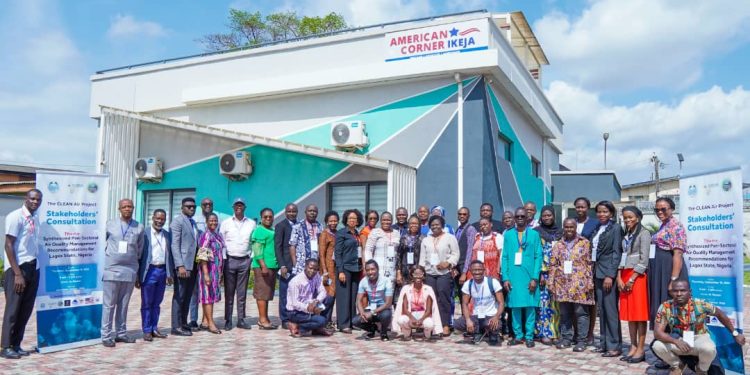Stakeholders from across various sectors came together in Lagos for a critical consultation aimed at tackling the city’s pressing air quality challenges. The event is part of the CLEAN Air Project; and themed “Synthesized Pan-Sectorial Air Quality Management Recommendations for Lagos State, Nigeria”, was held at the American Corner, Ikeja, Lagos.
The consultation marked a significant step under the “Evidence Use in Environmental Policymaking in Nigeria (EUEPIN) Project,” which seeks to foster the collaboration of researchers, policymakers, and environmental advocates to improve air quality management across Nigeria, with Lagos as the starting point.
The Clean Air Project, supported by the US Department of State, is a regional initiative that advocates for cleaner air in African cities through participatory monitoring, modelling, and policy development. Its goal is to mobilize stakeholders to achieve sustainable air quality management. Dr. Rose Alani, one of the contributors to the project, highlighted the significance of the effort: “This project is called Clean Air for Healthier Cities: Scaling up participatory monitoring, modelling, and Advocacy towards achieving clean air in West and East African Cities. Although we are beginning with Lagos, the intention is to eventually expand to other cities across the country as resources become available.”
Dr. Alani further emphasized that while air pollution is a recognized issue, policies to address it have been inadequate. “There’s a serious problem of air pollution, but little has been done in terms of policies to manage air quality effectively. This is why we are gathered here today—to brainstorm and formulate recommendations that can drive meaningful change in Lagos’ air quality management.”
Participants at the consultation included researchers, policymakers, environmental practitioners, and civil society representatives, who engaged in robust discussions aimed at formulating actionable solutions to Lagos’ air pollution crisis. The event focused on addressing pollution from various sources, including vehicular emissions, industrial activities, and domestic practices.
Dr. Olatokunbo Christopher Okiki provided insight into the Working Group (WG) methodology employed in the study, which includes systematic reviews, content analysis, and peer-reviewed literature. “The WG method consists of several key components, including a systematic review, content analysis, and information retrieval. We are assessing peer-reviewed articles, conference papers, reports, theses, and dissertations to identify evidence-based solutions for air quality management,” said Dr. Okiki.
Meanwhile, Dr Temitope Sogbanmu elaborated on the importance of collaboration across sectors to ensure that the recommendations are comprehensive and actionable. “We are not trying to replicate what others have done; rather, we are consolidating and pushing for actionable recommendations. This is a pan-sectorial activity where we have brought together stakeholders from various sectors to ensure all critical areas of air quality management are addressed,” Dr Sogbanmu explained. She also acknowledged the limitations of academic researchers in influencing policy directly, stating, “We are not policymakers; we are brokers. Our role is to facilitate interactions between evidence producers and users, but the actual policy development lies with the government.”
Mr Chrales Nnaji drew attention to several overlooked yet critical issues affecting air quality in Lagos highlighting the potential of the Nigerian Climate Change Act 2021 to serve as a framework for environmental governance.
Mr Nnaji emphasized the need for initiatives such as Clean Cooking Programs to improve indoor air quality, particularly in densely populated areas. He raised concerns about the environmental impact of ageing mass transit vehicles, which have become significant sources of CO2 emissions. Rather than being recycled, these vehicles are often sold to commercial operators, perpetuating the problem. He addressed the growing number of unregulated food vendors who use firewood for cooking indoors and outdoors, further contributing to poor air quality in many neighbourhoods.
The consultation was both a continuation of and a build-up of previous discussions held during the Clean Air Forum 2024, where similar topics were addressed. The goal of these meetings is to synthesize findings and provide evidence-based recommendations to Lagos State policymakers that can drive tangible improvements in air quality management.
Dr. Alani noted, “We are laying the groundwork for an improved air quality management system in Lagos. The work we do here is crucial, not just for Lagos but as a model that can be scaled across other Nigerian cities facing similar challenges.”
With ongoing support from the US Department of State and international collaborators, such as Makerere University in Uganda, the CLEAN Air Project aims to establish a strong foundation for sustainable air quality management in Lagos and beyond. The recommendations from this consultation will be synthesized into a formal policy brief, which will be presented to the Lagos State government with the hope of influencing future environmental policies and practices.

